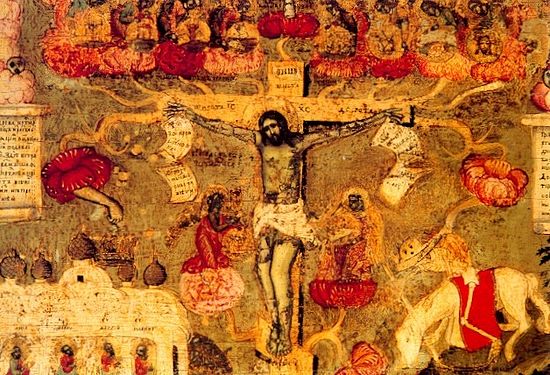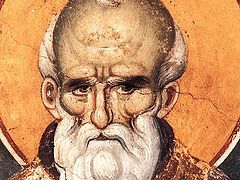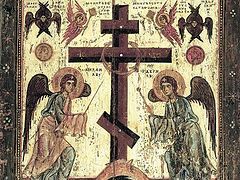Source: Orthodox Christian Network
March 10, 2016
Therefore He had to be made like His brethren in every respect, so that He might become a merciful and faithful high priest in the service of God, to make expiation for the sins of the people. For because He Himself has suffered and been tempted, He is able to help those who are tempted. Hebrews 2: 17-18 (Epistle on the Feast of the Annunciation—March 25)
When mankind fell through the sin of Adam and Eve, we severed our oneness, our perfect communion with God. The penalty for that sin was death. Before the Fall, there was no death, no sickness, no strife, no struggle. Where man was once “like God,” in the sense that he could live forever like God, this opportunity for immortality was now gone. At the end of his earthly life, man would be consigned to darkness and death. As Saint Paul writes in Romans 6:23 “The wages of sin is death.” This is the penalty that the human beings have to pay because of our choice to sin.
God created the world out of a sense of love, and it was (and is) that same love that God wished to express for humanity in wishing to redeem fallen man. But how could that come about? God had to become like one of us.
We’ve all had the experience of getting a bill in the mail, and on the bottom of the bill is usually written “remittance,” or “please remit with payment.” Remittance is what is owed on a bill. Now, let’s say that you get a bill from the utility company and it says “please remit $100.” And let’s say that I offer to pay the bill for you. Does the credit card company care if I pay the bill for you? No, they don’t, so long as the bill gets paid by someone. If the wages of sin is death, Christ came to earth, to be like one of us, so that He could remit that bill for us, this is why we say that He died for the “remission” of our sins. He paid the debt for us.
The Feast of the Annunciation, which is celebrated on March 25, falls exactly nine months before the Feast of the Nativity, and thus always falls during Great Lent. (We do not know the exact date that the Nativity occurred, but when the date was fixed as December 25, the church backed up 9 months to set the Feast of the Annunciation.) And so for one day during Lent, we set aside a strict fast and celebrate a Feast, the day that it was announced to the Virgin Mary that God would take on human flesh and become one of us.
Christ became like us in every way—He got tired, sick, angry, thirsty, and sad. He was tempted, just like we are tempted. He had fears, just like us. When His friend Lazarus died, He wept, just like we do when someone dies. When He contemplated His own death, He was afraid, just like we are.
This is one of the reasons why it is easier to trust in the Lord, because He became one of us. He knows our struggles because He experienced them. Yet, in His human experience, He did not succumb to temptation. He maintained His love for His Father at all times, He remained obedient at all times. He showed us what it is to love, and to empty oneself of all pride. Not only is Christ a faithful “high priest” in the service of God, but He also showed (and continually shows) us what mercy is.
Even though we do not see Him today in the flesh, many people get the “sense” that He walks with them, or that they walk with Him. I don’t think of the angels as being like us. I don’t think about walking with angels, or flying with angels. Many times when I think of Christ, I do think about “walking” with Him. Because He had the full human experience, I can use human terms to describe my relationship with Him, like “walking with Him,” or “talking with Him.”
The word “empathy” is often defined as placing ourselves in the shoes of another. Empathy makes us more compassionate towards other people. It is interesting that the etymology of “empathy” comes from two Greek words, “em” and “pathos.” “Em” means “in.” And “pathos” can be translated “feeling.” But it can also be translated as “passion”, meaning the things we struggle with. And it can also be translated as “suffering.” We call the sufferings of Christ His “Passion,” which comes from the same word. So, the word “empathy” can correctly be translated as “sharing in sufferings.” Christ has shared in our sufferings, so He can relate to us. If we share in His sufferings—trials, tribulations, temptations—staying obedient to God as He did, we will “relate” to Him, in THIS life, paving the way for us to live with Him in everlasting life.
In His exceeding compassion viewing with mercy our fall, the Co-Eternal Logos of the beginningless Father came down and appeared to the things below, never leaving the things on high. Having assumed Adam’s poverty to Himself He has taken on the other’s form. (From the Praises of Orthros of the Annunciation)
Be Godly today!




